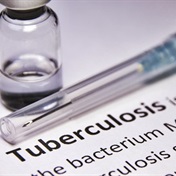
Cases of tuberculosis are falling in Europe but a failure to properly diagnose and treat dangerous drug-resistant strains of the contagious disease means it is far from under control, according to health experts.
Every day, almost 1 000 people across the 53 countries of the World Health Organisation's (WHO) European region fall sick with TB, and multidrug-resistant (MDR) and extensively drug-resistant (XDR) TB pose a serious risk to the goal of eliminating it by 2050, the experts said.
Read: Fears of completely drug-resistant TB
Data from the European Centre for Disease Prevention and Control (ECDC) and the WHO's regional office showed that drug-resistant TB strains affect at least 76 000 people in the region. But more than half are not properly diagnosed and only one in every three patients is successfully treated.
Treatment a long process
At 25%, the treatment success rate for XDR TB patients is even lower.
Treating even regular TB is a long process. Patients need to take a cocktail of antibiotics for six months and many fail to complete the treatment – fuelling growing drug resistance.
"We must reach all patients, not only half of them and 'half the way'," said Zsuzsanna Jakab, the WHO's regional director for Europe.
She said there was now an urgent need for new anti-TB medicines with shorter and more effective treatment courses that patients would be more able and more likely to stick to.
Often mistakenly seen as a disease of the past, TB has over the last decade developed into one of the world's most alarming public health threats with the emergence of drug-resistant or "superbug" strains that can't be treated, even with numerous drugs.
Of all infectious diseases worldwide, only HIV – the human immunodeficiency virus that causes Aids – kills more people.
Once known as the "white plague" for its ability to render its victims skinny, pale and feverish, TB causes night sweats, persistent coughing, weight loss and blood in the phlegm or spit. It is spread through close contact.
A manmade problem
Drug-resistant TB is a manmade problem and has developed because regular TB patients were either being given the wrong medicines or the wrong doses, or because they were not completing their treatment.
The WHO, which declared TB a global emergency in 1993, says up to 2 million people worldwide may become infected with drug-resistant strains by 2015.
Marc Sprenger, director of the Stockholm based ECDC which monitors disease in the European Union, said treating regular and MDR TB successfully was the only way to stop more dangerous and more highly resistant strains from developing.
"If we are not able to diagnose and treat patients with multidrug-resistant tuberculosis early and successfully, this not only puts patients' lives at risk but also paves the way for XDR TB," he said in a statement as the new data were published.
The WHO European Region comprises 53 countries, with a population of nearly 900 million people. The ECDC/WHO data showed an average annual 5.0% decline in TB incidence across the region over the last decade.
Read more:
Massive funding boost needed to beat TB




 Publications
Publications
 Partners
Partners











